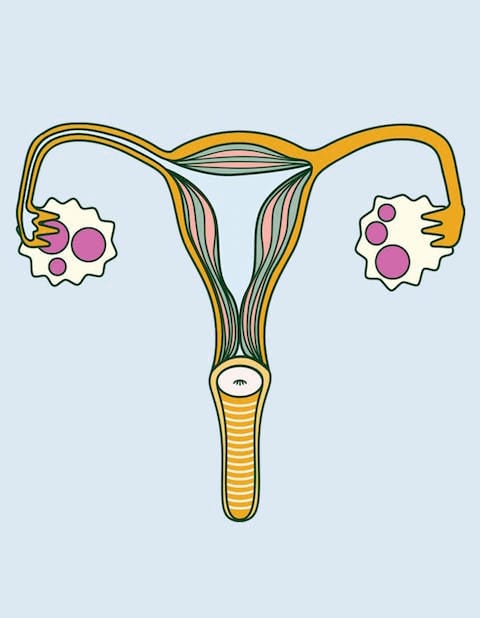

10-20% of women in their reproductive age reading this have Polycystic Ovarian Syndrome (PCOS). Only half of those who have PCOS will be properly diagnosed.
You have probably been told that polycystic ovarian syndrome is only for women who have cysts on their ovaries, this is wrong. Not all PCOS presents with cysts. PCOS is more of a metabolic condition due to blood sugar imbalances. For a long time, medicine thought that PCOS was due to male hormone imbalances (testosterone and androgen hormones). However, with more recent research, we are able to understand nowadays that PCOS is more than acne, period pain, irregular period and cysts on the ovaries. PCOS is correlated with insulin sensitivity, which leads to diabetes. Based on that, one of the conventional treatments to PCOS is prescribing Metformin, which is used as a diabetes drug, and helps manage blood sugar levels.
For the reasons above, many who suffer with PCOS are under-diagnosed, and it usually takes YEARS before someone who is curious about your health will sit down, listen to you, map your hormones and dive deep into diagnosis.
Women are usually misdiagnosed and have difficulty getting pregnant. The reason they are misdiagnosed is because some of them don’t have the cysts, however still have PCOS. PCOS is much more than your cysts, and one of the highest reason for infertility.
The reasons why you may have cysts, is because typically multiple eggs ripen and don’t get released, remaining on the ovaries. These eggs may be filled with fluid or chocolate like blood. When they burst, they cause extreme menstrual pain. Ovulation is a struggle in PCOS, therefore periods are often missed and irregular.
It’s important to treat PCOS because if left untreated, there are complications that may arise such as infertility, diabetes, heart disease, increased risk for endometrial cancer etc.

Symptoms of Polycystic ovarian syndrome:
Its a truly complex condition, no one woman will experience the exact same set of symptoms. Dr. Tali is very thorough with her blood work and hormonal testing in order to get to the root of your hormone imbalance.
Ultrasound and blood work is your first step in assessment. Dr. Tali will work with your MD for ultrasound referral and order a blood work tailored to your needs. Generally these are the markers she checks for:
CBC, Ferittin, fasting sugar, fasting insulin, HbA1C, vitamin D, LH, FSH, estrogen, progesterone, cortisol, free and total testosterone, prolactin, DHEAs, thyroid panel etc. It’s important to note, these hormones are to be tested on specific time and date of your cycle (something your family doctor may not tell you).
Additional hormonal testing may be offered if its necessary to check for hormonal metabolites, active hormones and conversion tendencies. Dr. Tali determines the need for that based on the patient case, in order to get to the root cause of your hormonal pathway and customize the treatment plan – remember, PCOS may be presented in many different ways and patterns!
PCOS can be caused by a number of different reasons, some of which are unknown. Let’s break down what we do know – insulin, androgens, and adrenal glands!
When insulin resistance occurs, your cells don’t respond to insulin, your body needs to produce more insulin in order to utilize all the sugars into your cells for energy. When insulin increases, it shifts your sex hormones to increase testosterone (male hormone) and reduces estrogen and progesterone (the main hormones you need for a healthy period).
Your adrenal glands can be a second reason to your PCOS, caused by stress and overproduction of cortisol. Your adrenal glands sit right on top of your kidneys, they are responsible to produce some of the sex hormones and stress hormone (cortisol). When you are stressed, you get an overproduction of cortisol, which actually makes your cells more resistant to insulin and the cycles described above occurs. Another way your adrenal glands can influence is by overproduction of DHEA and shifting it to produce more testosterone and less estrogen.
PCOS can be managed through evidence based Naturopathic Medicine treatments. Dr. Tali individualizes her treatment for you and your PCOS symptoms using evidence based herbal medicine, supplements, dietary modification, lifestyle changes, and acupuncture. Treating the root and addressing the ‘WHY’ do you have it in the first place. Naturopathic treatments focuses on blood sugar management, hormonal rebalance, and addressing the underlines cause as well as any symptoms you may be having.
Let’s get curious with you about your hormones, let’s dig deep together!
A note on conventional treatments: conventional treatment for PCOS involves Metformin which is a drug used to control blood sugars in diabetics. Another ‘treatment’ option is birth control. Keep in mind that to get pregnant you will have to come off birth control, and having birth control won’t fix your issues, it will just mask it. Read more on Birth Control here.